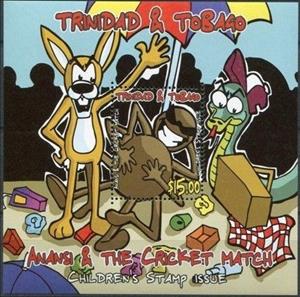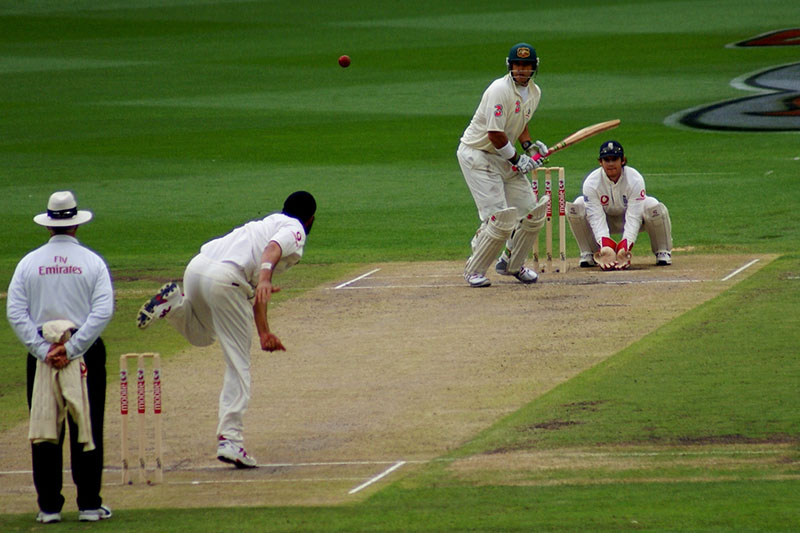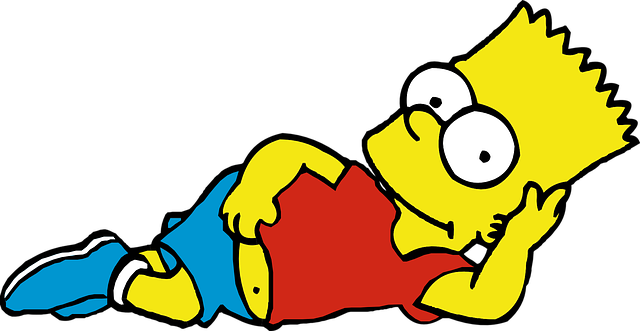Souvenir Sheet: Souvenir Sheet, Anansi rubbing stomach (Trinidad and Tobago 2005)
Souvenir Sheet, Anansi rubbing stomach (Trinidad and Tobago 2005)
12 December (Trinidad and Tobago ) within release Anansi and the Cricket Match goes into circulation Souvenir Sheet Souvenir Sheet, Anansi rubbing stomach face value 15 Trinidad and Tobago dollar
| Souvenir Sheet Souvenir Sheet, Anansi rubbing stomach in catalogues | |
|---|---|
| Michel: | Mi:TT BL72 |
| Stamp Number: | Sn:TT 774 |
Souvenir Sheet is square format.
Also in the issue Anansi and the Cricket Match:
- Souvenir Sheet - Souvenir Sheet, Anansi rubbing stomach face value 15;
- Stamp - Anansi and friends reading cricket brochure face value 1;
- Stamp - Anansi and friends hiding in bathroom face value 2.50;
- Stamp - Anansi and friends under umbrella face value 3.75;
- Stamp - Anansi holding bag, talking to woman face value 4.50;
- Stamp - Anansi laughing at friends paying woman face value 5.25;
- Stamp - Anansi rubbing stomach face value 15;
Souvenir Sheet Souvenir Sheet, Anansi rubbing stomach it reflects the thematic directions:
Cricket is a bat-and-ball game that is played between two teams of eleven players on a field at the centre of which is a 22-yard (20-metre) pitch with a wicket at each end, each comprising two bails balanced on three stumps. Two players from the batting team (the striker and nonstriker) stand in front of either wicket, with one player from the fielding team (the bowler) bowling the ball towards the striker's wicket from the opposite end of the pitch. The striker's goal is to hit the bowled ball and then switch places with the nonstriker, with the batting team scoring one run for each exchange. Runs are also scored when the ball reaches or crosses the boundary of the field or when the ball is bowled illegally.
A cartoon is a type of visual art that is typically drawn, frequently animated, in an unrealistic or semi-realistic style. The specific meaning has evolved, but the modern usage usually refers to either: an image or series of images intended for satire, caricature, or humor; or a motion picture that relies on a sequence of illustrations for its animation. Someone who creates cartoons in the first sense is called a cartoonist, and in the second sense they are usually called an animator.
The concept originated in the Middle Ages, and first described a preparatory drawing for a piece of art, such as a painting, fresco, tapestry, or stained glass window. In the 19th century, beginning in Punch magazine in 1843, cartoon came to refer – ironically at first – to humorous artworks in magazines and newspapers. Then it also was used for political cartoons and comic strips. When the medium developed, in the early 20th century, it began to refer to animated films that resembled print cartoons.


